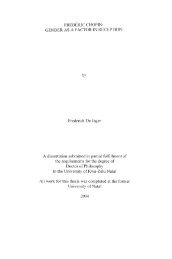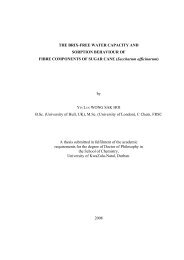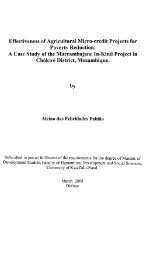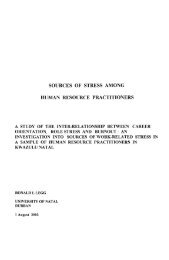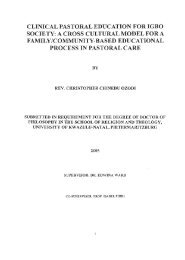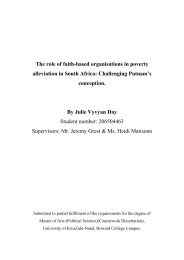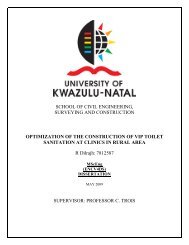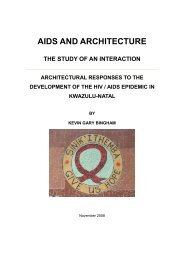View/Open - ResearchSpace - University of KwaZulu-Natal
View/Open - ResearchSpace - University of KwaZulu-Natal
View/Open - ResearchSpace - University of KwaZulu-Natal
Create successful ePaper yourself
Turn your PDF publications into a flip-book with our unique Google optimized e-Paper software.
that also caused breeding <strong>of</strong> flies that could cause infections to both the affected the infected<br />
families:<br />
“…You find that in these communities people stay in dirty places. You see what happens,<br />
there is running dirty water, people dump rotten food, bath water after bathing themselves or<br />
cleaning, washing or bathing a patients so it becomes very filthy with a lot <strong>of</strong> flies and the<br />
pipes get blocked and that’s where they even get their drinking water from. They leave<br />
squashed up in small places called shacks with everyone in there including T.B, HIV/AIDS<br />
patients they don’t open windows so they keep on infecting each other”<br />
(Focus group 8, organisation H)<br />
To deal with such challenges, Volunteer caregivers shared their knowledge through educating<br />
family members and other community members about hygiene; the use <strong>of</strong> protective clothing<br />
and proper waste disposal to prevent infections:<br />
“In that household you teach the family that hygiene is very important because it prevents a<br />
lot <strong>of</strong> diseases and infections. You teach them that they should open the windows for fresh<br />
air, particularly when there is someone who is sick. We teach them how to take care <strong>of</strong> the<br />
HIV/AIDS patient and also how to protect themselves from getting T.B especially if it is<br />
MDR. We tell them that they should always throw rubbish in a bin. They should wash their<br />
hands all the time and be clean. If they do not have a pit where they could throw rubbish,<br />
they should dig one. And cleaning the surfaces is important they need to be tidy.”<br />
4.6.8 Insufficient supply <strong>of</strong> water<br />
(Focus group 10, organisation J)<br />
Volunteer caregivers need water to practice hygiene such as washing soiled linen and bathing<br />
the patient. Poor hygiene causes the spread <strong>of</strong> infections and could deteriorate the health <strong>of</strong><br />
patients. Volunteer caregivers mentioned that there was no supply <strong>of</strong> water for days in some<br />
homes:<br />
“Water here has mood swings, it comes and goes so they announce with the truck for you to<br />
know when and draw and store in advance sometime we go and fetch it in some areas where<br />
water is available.”(Focus group 1, organisation A)<br />
In order to continue providing care to their patients, volunteer caregivers dealt with this<br />
challenge by taking their own 2 litre containers <strong>of</strong> water and sometimes they went to fetch<br />
from nearby areas that had water:<br />
57



